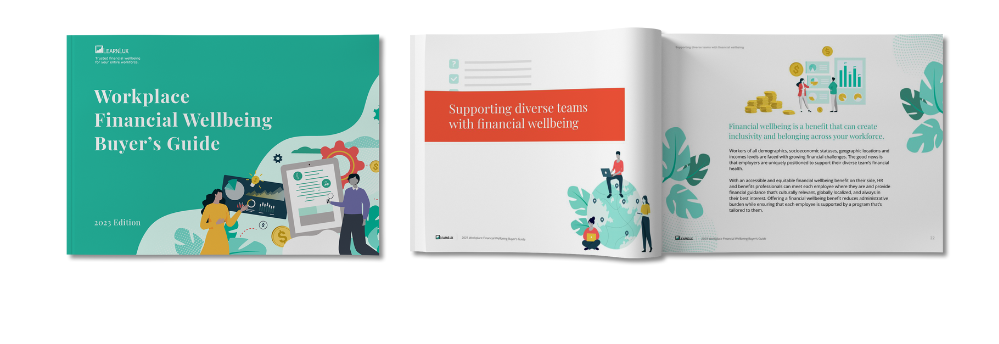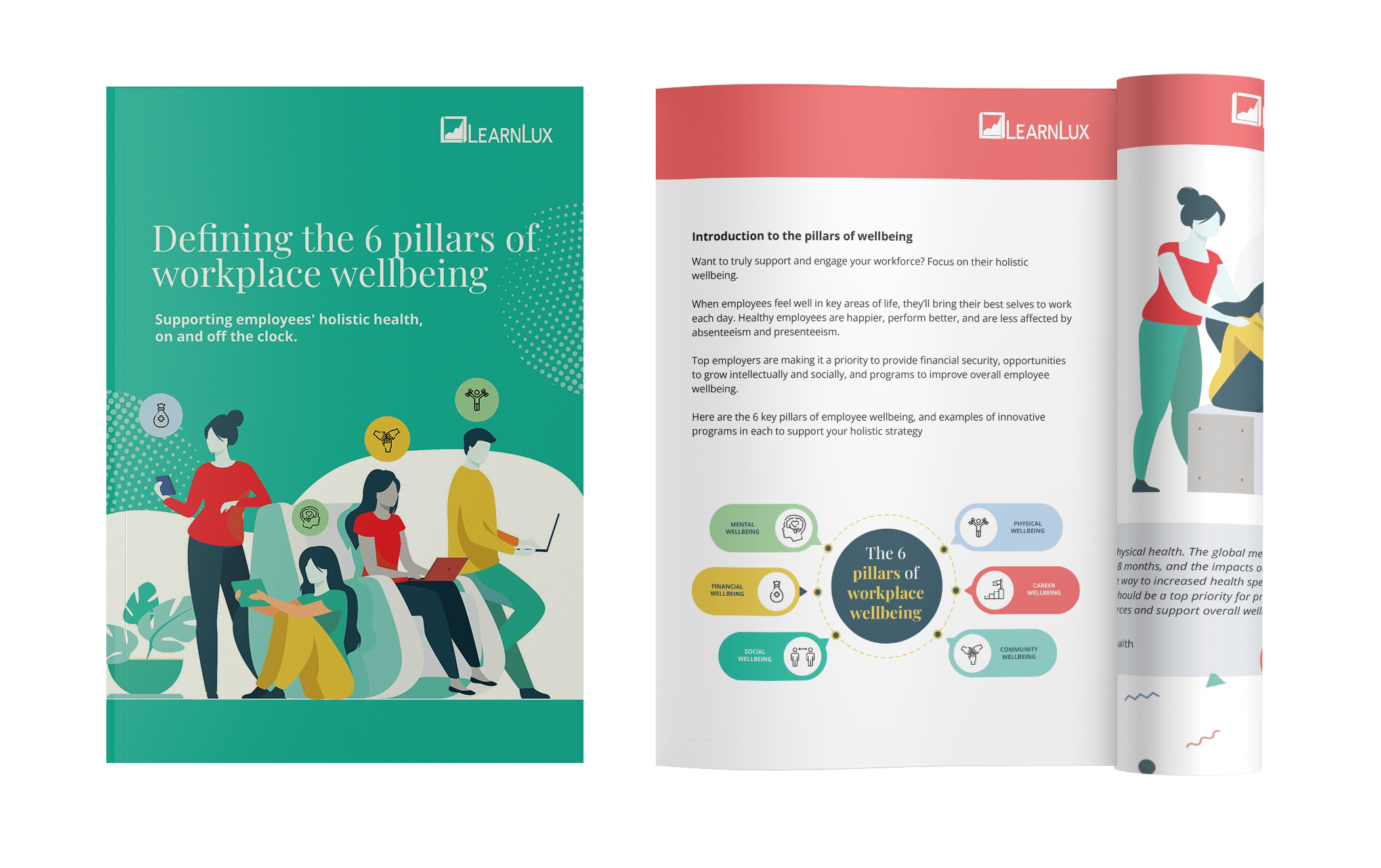Financial wellness is an important aspect of overall wellbeing. Defining what it means to have “good” financial wellness is an essential first step in developing effective programs and initiatives to support the financial wellbeing of employees.
In this LearnLux blog post, we'll explore how to define good financial wellness and why it is so important for benefits professionals to prioritize this aspect of holistic employee health.
Defining Good Financial Wellness

Financial wellness refers to the state of one's personal finances. This includes their ability to manage money effectively, save for the future, and make sound financial decisions.
However, the definition of financial wellness can vary depending on each individual’s and company’s goals. For example, a company with an hourly workforce may define employee financial wellness as support in managing cash flow, establishing an emergency fund, paying down debt, and improving credit scores. A high-growth tech company may define financial wellness as planning for retirement, understanding equity compensation, investing, and planning for big life milestones.
The definition of financial wellness should be tailored to the needs and priorities of the organization and its unique employees. This may involve assessing the financial literacy and knowledge of employees, identifying common financial challenges and stressors, offering 1:1 support from Financial Planners, and developing programs and initiatives to address the most pressing issues in the workforce.
Exploring financial wellbeing for your workforce? Download the Buyer's Guide.

Why Define Good Financial Wellness?

Defining good financial wellness is a critical first step in developing effective programs and initiatives to support the financial wellbeing of employees. Without a clear understanding of what financial wellness means for the organization and its employees, it can be challenging to develop targeted and effective programs.
Financial wellness is closely tied to employee engagement, productivity, and retention. Financial stress can lead to decreased productivity, increased absenteeism, and decreased job satisfaction – all of which can have negative impacts on the company’s bottom line. By prioritizing financial wellness, benefits professionals can help employees feel more financially secure and stable, which can lead to increased engagement and loyalty.
What is Good Financial Wellness?

Having good financial wellness is defined as meeting current and ongoing financial obligations and feeling secure in your financial future.
A person with good financial wellness will have:
- A manageable level of stress associated with current and future financial matters
- A manageable level of debt — or no debt at all — that an individual can pay off without financial penalty or significant stress on their financial situation or lifestyle
- Enough disposable income to maintain a desirable lifestyle, within reason
- An ample emergency savings fund that can sustain an individual’s lifestyle for at least three months
- Financial acumen that will allow an individual to plan appropriately for future goals and respond to unforeseen financial obstacles
There is no specific amount of money that someone must earn or save in their bank account to be financially well. Instead, the definition of financial wellness is closely tied to a person’s own sense of financial stress and financial confidence.
To expand on the concept of good financial wellness, here are a few additional points to consider:
- Financial wellness refers to an individual's ability to manage their money effectively, make sound financial decisions, and plan for the future
- Financial wellness involves understanding financial concepts, such as budgeting, debt management, retirement planning, and investment strategies
- Someone who is financially well is able to cover their expenses without worrying about making ends meet and has enough savings for emergencies and future goals
- Financial wellness is not just about income but also about managing expenses, living within one's means, and avoiding unnecessary debt
- Financial wellness is closely tied to overall wellbeing and can impact an individual's mental and physical health
- Financial wellness is an ongoing process and requires continuous learning and improvement
Strategies for Defining Good Financial Wellness in Your Unique Workforce

If you're a benefits professional looking to define financial wellness for your organization, here are some strategies to help you get started:
- Assess the needs and priorities of your employees: Conduct surveys or focus groups to identify common financial challenges and stressors among your employees. This can help you tailor your programs and initiatives to address the most pressing needs.
- Define financial wellness in measurable terms: Develop clear metrics and goals for financial wellness, such as increasing the number of employees who contribute to retirement savings plans, establishing benchmarks for employee emergency savings programs, or reducing the number of employees who report financial stress.
- Identify the key components of financial wellness: Consider the key elements of financial wellness, such as budgeting, debt management, retirement planning, and investment strategies. Develop programs and initiatives that address these key components and provide resources and support for employees to improve their financial health.
- Collaborate with other departments and external partners: Consider partnering with a trusted workplace financial wellness program along with other departments within your organization to develop and implement financial wellness programs. This can help you leverage expertise and resources and ensure that your programs are effective and sustainable.
- Align financial wellness with the other pillars of holistic workplace wellbeing: The six pillars of workplace wellbeing include financial, mental, physical, career, social, and community. Aligning the six pillars of workplace wellbeing is crucial for creating a comprehensive and effective workplace strategy. When the six pillars are aligned, it promotes a holistic approach, addresses multiple employee needs, creates a supportive culture, and increases engagement.
Financial wellbeing is one of the 6 pillars of holistic workplace wellbeing.
Key Takeaways About Good Financial Wellness
.png?width=1000&height=400&name=Untitled%20design%20(62).png)
Defining good financial wellness is an essential first step in developing effective programs and initiatives to support the financial health of employees.
By understanding the needs and priorities of your employees and tailoring your programs and initiatives to address these issues, you can help employees feel more financially secure and stable, which can lead to increased engagement and loyalty. Ultimately, investing in financial wellness is a smart strategy for benefits professionals who want to create a supportive and engaged workplace culture.
---
About LearnLux
![]()
LearnLux is the leading workplace financial wellbeing provider that blends fiduciary digital planning with access to one-on-one guidance from Certified Financial Planner™️ professionals. LearnLux's award-winning program equips employees with a financial plan to guide them through decision points like budgeting, paying down debt, electing benefits, understanding equity compensation, starting a family, buying a home, saving for retirement, and more. Advanced reporting keeps our partners in the know, and drives results like reduction in financial stress, increased productivity, reduced employee turnover, greater use of pretax products, on-time retirement, and healthcare savings. LearnLux members feel great about their money, allowing their work and wellbeing to thrive.
To learn more about LearnLux, visit learnlux.com.



